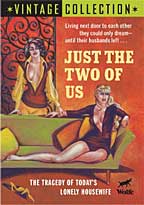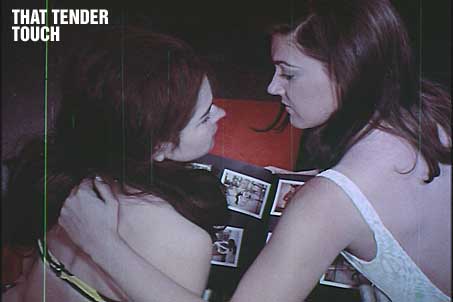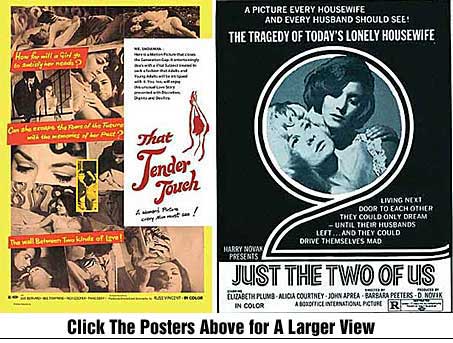
 |
||||||
|
GAY
FILM REVIEWS BY MICHAEL D. KLEMM
|
||||||
|
Desert Hearts Wolfe
Video, Director: Screenplay: Starring: Rated R, 96 minutes
That Tender Touch Wolfe
Video, Director/Screenplay:
Starring: Rating: R, 80 minutes

Just
The Two Wolfe
Video, Directors: Screenplay: Starring: Rated R, 82 minutes
|
Women
In Love
"[I
made Desert Hearts] because I wanted to see a film with a love
relationship between two women that didn't end in a bisexual triangle
or a suicide." 1986 was a landmark year for independent queer cinema, submitting - for our approval - two of the genre's greatest films: the late Bill Sherwood's Parting Glances, and Donna Dietch's Desert Hearts, which is now available in a 2 disc special edition from Wolfe Video. |
|
|
|
|
Viv is used to "order" in her life; little does she realize the journey she is about to take. She keeps to herself for the first few days before sharing a drink with Francis. While Viv recounts a marriage that was all facade, her host cherishes the memory of her late husband. Francis lives at the ranch with her son, Walter, and her stepdaughter, Cay. They are all she has, but she shakes her head when she talks about Cay. |
|
|
The courtship of Vivian and Cay is your classic opposites-attract story and the Sapphic angle unfolds before our eyes in a believable manner that, up until 1986, had never been seen on the screen before. It begins awkwardly with Viv discovering another woman in Cay's bed. Though shocked, she still finds herself drawn to the free-spirited cowgirl. (I've been wondering if Cay's name starts with a "c" to invoke James Dean's rebellious Cal in East of Eden.) The two women go horseback riding and Viv lets her hair down and buys western clothes when Cay takes her shopping. When one of the other women staying at the ranch tells Viv that Cay was thrown out of school for "unnatural acts," an annoyed Viv replies "Shall I raise my eyebrows and gasp?" But Viv still asks Cay "Have I misled you in some way?" before surrendering to that famous hot kiss in the pouring rain. |
|
|
As reported in The Celluloid Closet, Vincent Canby viciously attacked Desert Hearts in the Times, complaining that there wasn't enough information about Viv's failed marriage in order for the audience to accept her "hysterical response." In other words, the only reason a woman could possibly turn to another woman would be because of a bad experience with a man; this was a typical clueless straight male's hysterical response. Some queer reviewers found the ending to be too happy for a film that takes place in 1959, but the same can also be said about E.M. Forster's 1913 novel Maurice (published posthumously in 1971 and filmed in 1987). |
|
|
The film gets the deluxe 2 disc DVD treatment with a full length commentary, interviews, trailers and the raw footage for the love scene. This one is a keeper.
|
|
 |
|
|
At the other end of the spectrum, we have - also courtesy of Wolfe Video - two "dykesploitation" films from the 60s and 70s. You truly haven't lived until you've seen That Tender Touch (1969) and Just The Two Of Us (1975), two dreadful movies that make Valley of the Dolls seem like it was written by Eugene O'Neill. Throw a party, get as many friends together as you can, drink large amounts of alcohol, and watch these two atrocities. We're talking Reefer Madness territory here. That Tender Touch relates the "sad" story of lesbian lovers Marsha and Teri. Marsha's life revolves around Teri and she is devastated when Teri runs off and marries Ken. She shows up on their doorstop and becomes their house guest. An oblivious Teri prances around in provocative clothing as Marsha begs, pleads and grovels to win back her affection. Wait for the scene where Marsha chases a giggling Teri around the house and wrestles her to the floor. The ghost of The Children's Hour haunts the melodramatic finale.
These were not designed to be groundbreaking lesbian films; in fact if you click on the poster for That Tender Touch below to see the larger view you will see a tagline that reads "A woman's picture every man should see!" Both movies are distinguished by terrible scripts and even worse acting. Like most exploitation films of the era, they tease a lot and show very little. Look for the Love Story school of romance with scenes of horseback riding, rolling in the grass, riding a bicycle built for two, and carousing on a carousel. See wild hippie parties complete with hilarious performance art. See horrendous decorating and check out that green shag carpeting on the Brady Bunch stairs. See the worst seduction scene ever filmed. Add your own dialogue as you reflect on how far we have come. |
|
 |
|
|
That Tender Touch was discovered by lesbian film historian Jenni Olson and it stars Sue Bernhard, a 1966 Playboy centerfold and co-star of the Russ Meyer schlock classic Faster Pussycat! Kill! Kill!) Just The Two Of Us was directed by Barbara Peeters, a protege of Roger Corman. Both films are in terrible shape but this only adds to their entertainment value. Both have been preserved by Outfest's Legacy Project at UCLA Film & Television Archive for their historical value. More
On Helen Shaver and Donna Dietch: |
|